| Reviews & Columns |
|
Reviews DVD TV on DVD Blu-ray 4K UHD International DVDs In Theaters Reviews by Studio Video Games Features Collector Series DVDs Easter Egg Database Interviews DVD Talk Radio Feature Articles Columns Anime Talk DVD Savant Horror DVDs The M.O.D. Squad Art House HD Talk Silent DVD
|
DVD Talk Forum |
|
|
| Resources |
|
DVD Price Search Customer Service #'s RCE Info Links |
|
Columns
|
|
|
Kill or Cure (1962, Warner Archive Collection)
Genial and amusing...but you won't die laughing. Warner Bros.' Archive Collection of hard-to-find library and cult titles has released Kill or Cure, the 1962 Metro-Goldwyn-Mayer English comedy from the same production team that launched the successful Margaret Rutherford Miss Marple series, and starring Terry-Thomas, Eric Sykes, Dennis Price, Lionel Jeffries, Moira Redmond, Katya Douglas, David Lodge, Ronnie Barker, Hazel Terry, and Derren Nesbitt. Always right on the comedic cusp of "taking off," Kill or Cure unfortunately winds up as just a mildly diverting exercise for the gap-toothed Terry-Thomas and bumbling sidekick Eric Sykes. That doesn't mean lovers of English comedy from this period won't find something of value here...as long as they know the bar isn't set too high. No extras for this very nice-looking anamorphically-enhanced widescreen black and white transfer.
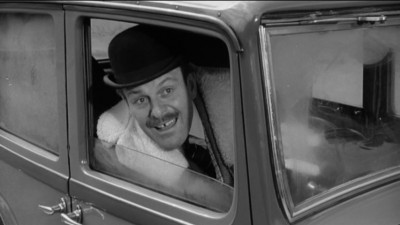
Combination "snoops or snaps" private detective/portrait photographer Captain J. Barker-Rynde (Terry-Thomas) receives a call from rich widow Mrs. Margaret Clifford (Anna Russell), who thinks that something fishy is going on at the Green Glades Health Hotel ("We Help Nature Help You"), where she lives. Upon arrival as an incognito guest, the food-loving Barker is put on a punishing diet and exercise routine by the Glades's clinical therapist, Rumbelow (Eric Sykes). Sooner than you can say, "Carrot juice?", the alcohol-and-snacks-deprived Barker discovers his potential employer has been poisoned, and her secretary, Frances Roitman (Moira Redmond), almost killed, as well. Who did it? Mrs. Clifford's nephew, Roger Forrester (Derren Nesbitt), who's also dating Frances? Or Dr. Julian Crossley (Dennis Price), the Glades's owner who may see some of Mrs. Clifford's estate? Or how about Nurse Rita (Katya Douglas), who has a secret connection to someone involved in the murder? Detective Inspector Hook (Lionel Jeffries), and his assistant Burton (Ronnie Barker), are called in to investigate, while Captain Barker and Rumbelow--after a period of suspicion where they each believe the other is the murderer--team up to find the culprit...as the bodies continue to pile up.
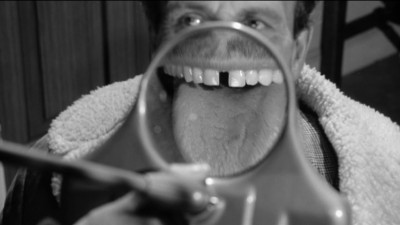
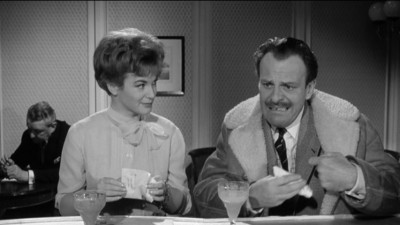
I saw Kill or Cure years and years ago on AMC (when they didn't have commercials, and old movies were routinely letterboxed), but I couldn't recall too many of its details when this Archive disc showed up in the post--and with good reason, I soon discovered. When Kill or Cure begins with a series of clever ink drawings highlighted by composer Ron Goodwin's delightful, sprightly theme, I thought, "Why don't I remember more of this? Should be fun!" That initial hope was confirmed with Terry-Thomas' first scene, where he consumes a meal with gusto as he receives his further snack particulars for an upcoming job (when he bares those gapped teeth and deliciously suggests adding a Cadbury chocolate bar to his already enormous lunch, the effect is gigglingly perfect). Now, that isn't the last time I laughed during Kill or Cure...but there's no question that the time lapse between chuckles began to string out further and further as the movie bore on, as one promising set-up after another dissolved without an adequate payoff, while the moviemakers seemed more interested in crafting a straight whodunit instead of elaborating on the movie's obvious comedic possibilities.
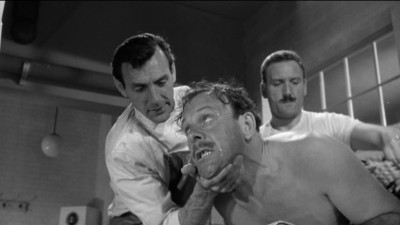

During the peak years of his movie career, the rap on Terry-Thomas was always: 1) he's not Peter Sellers, and 2) he can't carry a movie alone. There was a time before both turned to the American and international markets when Terry-Thomas was the far-bigger star than Sellers in the British cinema. Eventually, Sellers' more prominent movie roles and A-list celebrity status eclipsed Terry-Thomas, with critics praising Sellers' versatility while damning with faint praise Terry-Thomas' hilarious but increasingly single-note "stereotypical English rotter" character, which often came with an equally rigid costume of bowler hat, pencil moustache, and cigarette holder (just look at the poster art for Kill or Cure to see how M-G-M caricaturized him). As for not being able to "carry" a movie...he did just fine in some of his earlier (and better written) English pictures (1959's Carlton-Browne of the F.O. is probably the best example). However, when he made a career decision to ditch his other gigs like radio and TV and live performances to compete on a higher level (certainly in terms of money and publicity) when he moved to Hollywood in 1961, the failure of his first starring role in Frank Tashlin's Bachelor Flat hurt his momentum (M-G-M's Kill or Cure soon followed, which showed only a tiny profit). Studio heads and directors and casting agents not only in America but internationally eventually put Terry-Thomas into the category of reliable-yet-strictly supporting comedic player when it came to big-budget outings. He made a lot of money doing this in the 1960s, with popular turns in high-profile productions like It's a Mad, Mad, Mad, Mad World, Those Magnificent Men in Their Flying Machines, and How to Murder Your Wife; however, as the decade wore on, it became clear Terry-Thomas would take any part in any international movie, as long as the check was large and the location attractive--no doubt fun for the fun-loving actor...but maybe not the best move career-wise. It's interesting to note that although Terry-Thomas continued to pull down nice salaries for indifferent (or even downright horrible) movies in the late 60s and very early 70s, before his Parkinson's diagnosis quickly hampered his career, his rival Peter Sellers was doing even worse, almost slipping into obscurity in the early 70s before Blake Edwards resurrected The Pink Panther franchise and made Sellers an international figure all over again (had he not become ill, could the same thing have happened for Terry-Thomas? Who knows...).
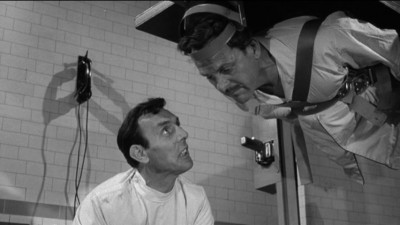
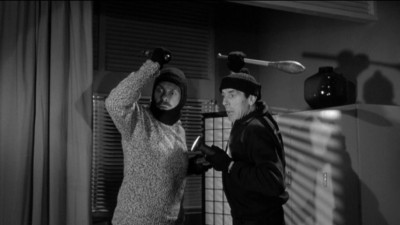
With top-billing and more screen time, Terry-Thomas is the star of Kill or Cure, but whether or not the movie is a good test of his ability to "carry" a movie is complicated by the arrival of Eric Sykes, a multi-talented writer and performer who was also popular in England at the time (and who isn't very well known to mainstream American movie audiences, I would imagine). Kill or Cure starts off as a "Terry-Thomas" vehicle, but before the halfway mark, it's clearly more a "Terry-Thomas and Eric Sykes" team effort, so...who's to blame for the movie's fair-to-middling effect? Well, neither one of them, it turns out--Kill or Cure's problems stem from its surprisingly tepid script and the flat direction, not from these two veteran performers (or the rest of the talented cast, for that matter). Directed and scripted by the same team responsible for Metro's wildly successful Miss Marple series starring Margaret Rutherford (George Pollock at the helm of Jack Seddon's and David Pursall's screenplay), Kill or Cure spends far too long on exposition scenes involving and explaining the one element of the story we really don't care about (particularly since the solution is so easy): the mystery. That wouldn't have been a problem, though, if someone had taken the time to fully develop not only the comedic possibilities of a private detective going undercover at a health club, but also to deliver satisfying pay-offs for the few farcical scenes they do have here. When Terry-Thomas cringes in horror when he realizes the hotel's bar only serves non-alcoholic health drinks, it's quite funny; it plays well off his already-established screen persona. However, when you give Terry-Thomas a salt-and-ice water rubdown, or strap him to a rotating massage table, it could be anyone--so you better deliver on the slapstick possibilities of those gags...which sadly doesn't happen here. I don't want Kill or Cure to be a Three Stooges short (actually, that would be fine, too), but if it can't deliver enough scenes of the sly British comedy I was expecting (how the hell do you take the sublimely snotty Dennis Price...and make him boring?), then the scenes that tease us with slapstick possibilities better be slapstick. Frankly, I would have rather had a lot more subtle stuff like Sykes and Terry-Thomas eyeing each other suspiciously at dinner, wondering if they're poisoning each other, or Terry-Thomas watching Jeffries eat a hearty meal, and dying inside from hunger. But if those genuinely sly, humorous moments are crowded out by rather pedestrian mystery-solving, then the promised, hinted-at sight gags should produce...and they just don't in Kill or Cure, leaving us with a tired mystery we've seen before, and funny actors without proper material.
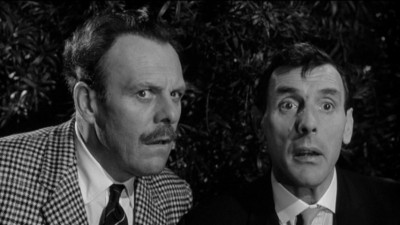
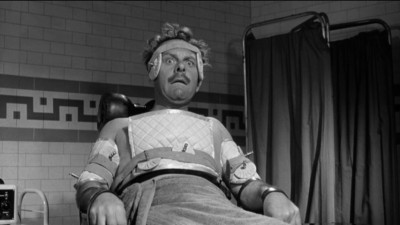
The Video:
The anamorphically-enhanced, 1.85:1 widescreen black and white transfer for Kill or Cure looks excellent, with nicely-balanced contrast, solid blacks, a sharp image, and few imperfections.
The Audio:
The Dolby Digital English mono audio track is clean, with very little hiss. No subtitles or closed-captions available.
The Extras:
No extras (pity no original trailer--I would have liked to see how they sold this one).
Final Thoughts:
A prescription for laughs...with medicine past the expiration date. Now, if you're like me when it comes to 60s English comedies, Kill or Cure isn't going to have to do a whole lot to give you a genial good time--just the sight of Terry-Thomas sputtering around a health clinic is good for some giggles. But clearly there's potential here for a much funnier comedy, one that's hinted at constantly, but one that frustratingly fails to materialize again and again. A rental, therefore, is best for Kill or Cure.
Paul Mavis is an internationally published movie and television historian, a member of the Online Film Critics Society, and the author of The Espionage Filmography.


|
| Popular Reviews |
| Sponsored Links |
|
|
| Sponsored Links |
|
|
| Release List | Reviews | Shop | Newsletter | Forum | DVD Giveaways | Blu-Ray | Advertise |
|
Copyright 2024 DVDTalk.com All Rights Reserved. Legal Info, Privacy Policy, Terms of Use,
Manage Preferences,
Your Privacy Choices | |||||||












